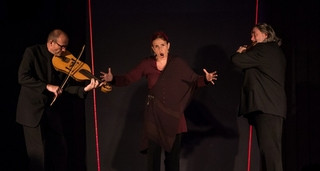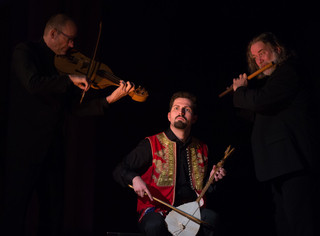|
Back
Songs of the Earth New York
James Memorial Chapel/Union Theological Seminary (3041 Broadway at 121st Street)
10/20/2015 - & October 21, 2015
White Light Festival:
Heretical Angels (U.S. premiere) Sung in Old Church Slavonic and medieval Bosnian/Croatian dialects
Dialogos Ensemble: Katarina Livljanic (voice, text adaptation, co-musical reconstruction, director), Albrecht Maurer (vičle and rebec), Norbert Rodenkirchen (flutes); Kantaduri Ensemble: Josko Caleta (voice, co-musical construction, director), Jure Milos (voice, gusle and dvojnice), Nikola Damjanovic, Srecko Damjanovic, Milivoj Rilov (Voices)
Sanda Herzic (Staging), Marie Bellot (Lighting Design), Darko Rundek (Recorded Sound), Marinka Simic, Marija Ana Dṻrigi (Philological Advisors)

A. Maurer, K. Livljanic, N. Rodenkirchen (© Kevin Yatarola)
The magnitude of Heretical Angels is not an hour-long presentation of ancient languages, creeds, mantras and music. Its importance lies in the fact that medieval music specialist Katarina Livljanic, her “Dialogos” ensemble and the “Kantaduri” ensemble, have attempted–and very well succeeded–in bringing its audience to the beginnings of human time itself.
That its 18 sections in front of an eight-foot high, black Kaaba-shaped megalith serve as a background for Christian rituals which pre-date Jesus, the Old Testament and in fact, the Assyrian religion which gave it birth.
Ms. Livljanic was inspired by a recently-discovered ancient Bosnian tombstone recently discovered, which read, in ancient Bosnian script, “When I wanted to exist, I couldn’t”. What did this mean? What was the story behind it? What philosophical system generated such words? That we may never know. But Ms. Livljanic with the help of philologists, ancient-music specialists and other experts from the Sorbonne (where she is Master of Conferences in Medieval Music) and Central Europe, have put together a litany–a sometimes heretical litany–which goes to the very start of our beings.
In a way, these different sections reflect the Christian religion we know: the beginning of the St. John Gospel, the Lord’s Prayer, a song to the Virgin on the “bright” side. Excommunication, Exorcism, a dialogue between and Evil and Good Angels on the dark side.
But in its totality, Ms. Livljanic has brought us to a litany which far far predates the Christianity of Jesus (man or christos), with hardly mention of compassion or mercy or “doing good” or even prayer. These musical sections–chants, songs, music with strange instruments–is the music of magic. Dark and white magic, snakes and curses, vanity, and, above all, the mystery of death.
Not death and resurrection, but the death of “biting this stone from the inside”, the dead saying, “I am gone. I cannot return.”
In one way, the poetry quoted here reflects the same strange angels, mythical places, horrors and glories of William Blake. But Blake’s poetry (like that from theBook of Revelations) was symbolic. In Ms. Livljanic’s Heretical Angels, it is reality.
The music here is, to a degree, like the music of any folk people in Eastern Europe. I have heard the same instruments in the countryside of Rumania and Albania, reading about it in Polish novels. It is harshly dissonant: minor-seconds without any resolution. A double-flute playing half a note apart from itself, descants which have little to do with the chants itself.
Russian church music of the 13th Century has that same harshness–yet here, it is not meant to be harsh. It seems natural, heaven sent.
Ms. Livljanic sings with a voice which is an element of nature. At her low alto register, she has the purity of a Joan Baez. But she can also growl, and sing in a joyous soprano. The four male singers of Kantaduri Ensemble are so close-knit in harmonies, so perfect in concordance that they seem one organism, departing for those polyphonic dissonances, returning. Their emotions are furious in the exorcism, expressive and passionate in the prayers.

A. Maurer, J. Milos, N. Rodenkirchen (© Kevin Yatarola)
At times they sing from offstage (the opening chant is repeated during the hour like a leitmotif), but otherwise they sing with the instruments. A flute brilliantly played by Norbert Rodenkirchen, and the two old viols, played by Albrecht Maurer, whose own studies in these ancient runes were essential.
Jure Milos was in a class by himself. I have heard much unusual music in (what was then) Yugoslavia, but never the gusle, a single-stringed instrument to which he sung totally in sync with the lines and bowing.
Yet these are but individual parts of an organic whole, which had its ardent mysteries, emphasized by its setting in the Union Theological Seminary and the pipe of its organ soaring to the top of the building. The mystery was accented by the language as well.
Few in the audience knew Old Church Slavonic (though Leos Jánacek used this language in his great Mass). As for medieval Bosnian and Croatian dialects, I am certain New York has a few medieval Bosnian and Croatian cab-drivers. But to the rest of us, the English subtitles were sufficient.
Even without this, though, Ms. Livljanic had produced an epic of magic and revelation. It was the great French philosopher Antonin Artaud who wrote so expressively about theater as magic–magic language, magic gestures, magic words and music from the eath. His example was Balinese theater, which itself predates both Hinduism and Islam. Ms. Livljanic has created a religion which is liturgically antediluvian. And those of us open to its ecstatic spell may have caught a shadowy glimpse of our own still-pulsing, Divine Breath.
Harry Rolnick
|